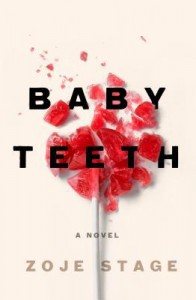Not For Everyone

Zoje Stage’s debut novel, Baby Teeth, has received very polarized reviews from both readers and critics. The novel tells the story of a young family struggling to parent a child who seems to be extremely disturbed, if not downright evil. As the book opens, 9-year-old Hanna is receiving an MRI, a last-ditch attempt by her parents to see if her mutism has a physiological basis. The news is received with both relief and dismay by her mother, Suzette, who was hoping that her daughter would be able to receive a clear diagnosis and mode of treatment. When it appears that Hanna’s complete lack of verbal or written communication is selective, it is up to Suzette to examine her own contribution to her child’s condition. The chapters alternate between the perspectives of Suzette and Hanna, and the reader is privy to the fact that Hanna harbors some violent designs against her mother. Suzette is desperate to provide her daughter with everything she was deprived of as a child and remains obsessed with appearances, even as her fears and resentments grow. As Hanna’s attacks on Suzette escalate, Suzette attempts to convince her husband that something is seriously wrong with the girl. She even starts to retaliate against Hanna, increasingly treating her like an adult nemesis. Alex (the stereotypical clueless father) is reluctant to believe that Hanna is anything but the sweet little girl that he has witnessed. As he coddles and spoils her, her mother sneers and taunts her. Hanna begins to plot a way to “remove” Suzette from their family so she can be alone with Alex. Since the book has a small cast of characters, Stage creates a claustrophobic feeling that adds to the foreboding tone. Is Hanna’s behavior a result of a congenital psychological disorder, or caused by her parent’s failed efforts at raising her? Do we erroneously assume that love is deserved unconditionally between parents and children and vice versa? There really is no sympathetic character for the reader to side with in the book, and the result can be discomforting. Much of the controversy about Baby Teeth involves the perceived sexualization of a child, presented in an excessive and overt manner. Stage was obviously very inspired by the Freudian concept of the Oedipal Complex when composing this novel. Those readers put off by the descriptions of this element should know that Hanna’s drive is presented as more of a bid for her father’s absolute attention rather than a literal desire for consummation. This book is not for everyone, and most readers will know pretty quickly if Baby Teeth is a selection they can tolerate or would choose to add to their DNF pile.



